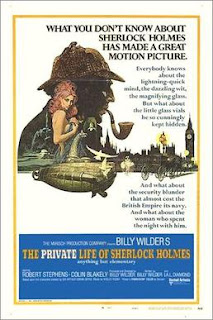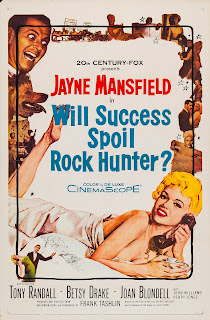Wednesday, January 5, 2022
The Private Life of Sherlock Holmes
Tuesday, January 4, 2022
Winchester '73
Monday, January 3, 2022
Will Success Spoil Rock Hunter?
Frank Tashlin's Will Success Spoil Rock Hunter? -- while deviating from the premise of George Axelrod's original stage play -- is such an example. In the sixty-five years since its release, its satirical portrayal of celebrity and fan culture is all the more prevalent thanks to the advent of social media. (Good thing Tashlin isn't around to see fiction become reality.)
Being a former animator, Tashlin's background is very apparent throughout Will Success Spoil Rock Hunter? With enough visual gags that wouldn't look out of place in your standard cartoon, it shows that he was one of the more unique directors working at the time. It's little wonder that Tashlin was a mentor to Jerry Lewis.
On a similar note, there's enough fourth wall-breaking in Will Success Spoil Rock Hunter? to warrant calling a mason afterwards. Be it towards the stars' private lives or their professional ones, Tashlin's script spares no expense. (Man, comedies from the 1950s were something else, weren't they?)
Will Success Spoil Rock Hunter? starts to lose steam by the third act but Tashlin and the cast make it work nonetheless. Being made when sex comedies were becoming commonplace, it has the distinction of being just a touch classier than later titles. (Faint praise, granted.) Hey, the sexual revolution (and the MPAA's fruition) was only a few years away.
My Rating: ****
Sunday, January 2, 2022
Dragonwyck
By the time Mankiewicz made his directing debut with Dragonwyck, he had been well-established for several years. (He got the gig because original director Ernst Lubitsch fell ill.) And boy, you'd never know this was his first time directing as you watch it. (Granted, he also co-wrote the script so already he had an idea of how the film flowed.)
Bearing elements reminiscent of Rebecca six years earlier, Dragonwyck is the kind of film that Hollywood -- barring Crimson Peak, perhaps -- doesn't make anymore. And that's a shame, really; it's a genre that has a little bit of everything (with more focus on some elements than others) and it's a solid deviation of the standard romance. (Because -- let's be honest -- romance itself is more complex than what Hollywood has us believe.)
Having more screentime together here than in their previous collaborations (Laura and Leave Her to Heaven), Gene Tierney and Vincent Price have excellent chemistry together. And Price -- after years of bit parts and supporting roles -- finally has a meaty role to sink his teeth into. (It was originally going to be Gregory Peck but he dropped out after Lubitsch did.) Makes you wonder had he gotten more roles like this throughout his career.
Dragonwyck is one of those few directorial debuts that works after all these years. With stunning cinematography by Arthur C. Miller and a chilling score from Arthur Newman, it just proves that Hollywood has been playing it safe for too long. Take more risks, Hollywood, like you did before the MPAA came to fruition.
My Rating: ****1/2



